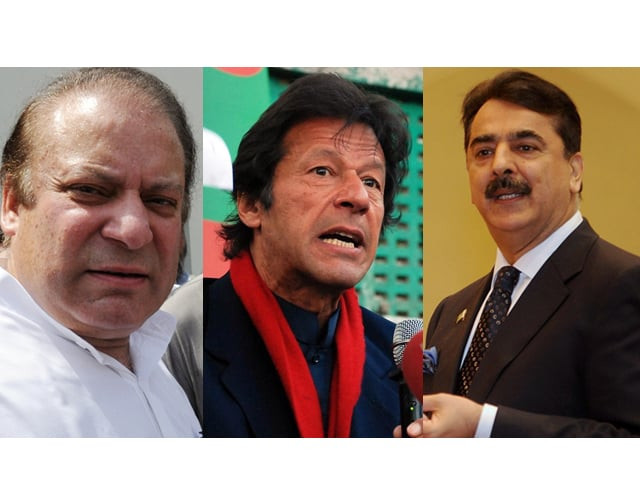PM’s disqualification: Avalanche of court challenges greets speaker’s ruling
PTI, PML-N file separate petitions in the Supreme Court.

The saga of the prime minister’s conviction officially entered a new phase on Monday.
A contentious ruling by the National Assembly speaker last week, striking down calls to disqualify the prime minister, was expected to be challenged in court – which it was on Monday, by a number of petitioners and on a number of grounds.
Two separate petitions were filed in the Supreme Court, one in the Peshawar High Court, while a petition in the Sindh High Court has already resulted in notices being sent on Monday to National Assembly Speaker Dr Fehmida Mirza, Prime Minister Yousaf Raza Gilani, the chief election commissioner (CEC) and the federal government.
The principal competition was between two opposition parties – the Pakistan Tehreek-e-Insaf (PTI) and Pakistan Muslim League-Nawaz (PML-N).
The PTI was the first to announce its intention to file a challenge – through an announcement by its chairman Imran Khan at a rally on Sunday.
Imran filed a petition through his central party leader Advocate Hamid Khan, requesting the Supreme Court to declare the speaker’s decision unconstitutional, and a violation of justice and independence of the judiciary. The petition argued that Dr Mirza had no right to sit on the Supreme Court’s judgment since her membership of the house was on a special seat reserved for women.
“The decision of the speaker is evidently an abuse of power vested in her and her decision is clearly meant to benefit her political bosses – Prime Minister Yousaf Raza Gilani and President Asif Ali Zardari,” the petition said.
Dr Fehmida Mirza was charged with obstructing justice and the exercise of constitutional jurisdiction by the ECP. The petition also stated that the speaker undermined the independence of the judiciary. Imran also censured the speaker’s ruling, saying that she had ignored the fact that the Supreme Court had clearly mentioned the consequence of disqualification under article 63(1) (g) of the Constitution.
The PTI chief requested the court to direct the speaker to decide the question of disqualification of prime minister as having been deemed to have been referred to it under article 63(2) and (3).
The PTI chief said that every option would be used for implementation of the Supreme Court’s judgment, adding that the PML-N was simply following the PTI in each and every matter, including the filing of a petition.
The PTI chief was referring to an announcement by PML-N, hours after the PTI’s announcement, that it too would file a petition on the matter.
PML-N follows suit
PML-N MNA from Sialkot Khawaja Muhammad Asif filed a petition under Article 184(3) of the Constitution. The party requested the court to restrain the prime minister from functioning as the prime minister and member of National Assembly.
The petition questioned whether the speaker’s ruling under Article 63 (2) of the Constitution could defeat the judgment of a seven member bench of the SC which had attained finality after the PM decided not to file an appeal and whether the speaker’s ruling “can flagrantly disregard the rights of all citizens.”
It added that Dr Fehmida’s decision was a “complete violation of the Constitution” and demanded urgent redress under Article 184 (3).
It also questioned whether the right of a fair trial also mandates a corresponding duty to abide by the verdict of a fair trial, which cannot be violated by the NA speaker. It argued that the ruling cannot be protected under Article 69 of the Constitution “by any legal stretch of imagination”.
Sindh High Court notice
Meanwhile, the Sindh High Court issued notices to Dr Fehmida Mirza and Prime Minister Gilani, the CEC and the federal government on a similar petition.
Advocate Moulvi Iqbal Haider – who had actually filed a reference before the National Assembly speaker against Prime Minister Gilani following his conviction by the Supreme Court in contempt of court charges back on April 26, – submitted that the impugned decision of the National Assembly to not submit the disqualification reference was a violation of Articles 4, 5, 9, 10, 25 and 63(2) of the Constitution as well as the oath prescribed under the Constitution.
An SHC division bench, headed by Justice Faisal Arab and Justice Nadeem Akhtar, asked the petitioner to argue on the maintainability of the petition as proceedings of the National Assembly or the speaker’s decision could not be questioned before any court of law.
The petitioner submitted that only the president and prime minister were immune to court proceedings under Article 248 of the Constitution of Pakistan 1973, adding that only in a case of an irregularity did the speaker’s decisions have protection.
After initial arguments, the bench ordered the issuance of notices
Peshawar High Court petition
The speaker’s ruling was also challenged in the Peshawar High Court (PHC). Advocate Abdul Samad Khan Marwat, a member of the Human Rights Commission South Asia (HRCSA), filed the writ petition and made the ECP, National Assembly speaker and prime minister respondents.
When contacted, Abdul Samad Khan Marwat told The Express Tribune that Article 199 of the Constitution gave the right to every citizen of Pakistan to challenge the speaker’s ruling.
(Additional input from Zeeshan Mujahid in KARACHI and Umer Farooq in PESHAWAR)
Published in The Express Tribune, May 29th, 2012.


1725254039-0/Untitled-design-(24)1725254039-0-208x130.webp)
















COMMENTS
Comments are moderated and generally will be posted if they are on-topic and not abusive.
For more information, please see our Comments FAQ